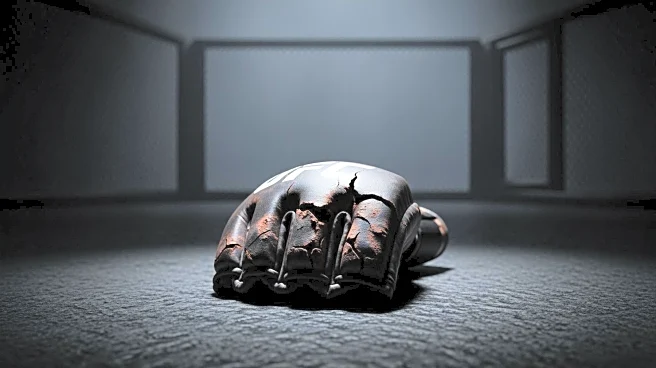What's Happening?
Dana White, CEO of UFC, has announced that Dillon Danis is banned from attending future UFC events following his involvement in a brawl during UFC 322 at Madison Square Garden. The altercation occurred in the spectator seating before the main card featuring
Islam Makhachev, who won the UFC welterweight title. Danis reportedly fought with members of Makhachev's team, including Abubakar Nurmagomedov and Magomed Zaynukov, as security attempted to restore order. White stated that the organization would not press charges against Danis, citing the nature of the fight business. Danis has a history of conflict with Team Khabib, dating back to a 2018 incident involving Conor McGregor and Khabib Nurmagomedov.
Why It's Important?
The ban on Dillon Danis highlights ongoing tensions within the UFC community, particularly involving rival camps. This decision by Dana White underscores the importance of maintaining order and safety at high-profile events. The incident may impact Danis' career and reputation, as he is now excluded from one of the largest platforms in mixed martial arts. The brawl also reflects the challenges UFC faces in managing personal rivalries that can escalate into public altercations, potentially affecting the sport's image and its relationship with venues and sponsors.
What's Next?
While Danis is banned from UFC events, he is scheduled to defend his Misfits MMA title against Anthony Taylor in Dubai on December 20. The UFC will likely review security protocols to prevent similar incidents in the future, especially concerning seating arrangements for fighters with known rivalries. Dana White's decision not to press charges may influence how future incidents are handled, balancing the sport's aggressive nature with public safety concerns.
Beyond the Headlines
The incident raises questions about the ethical responsibilities of sports organizations in managing athlete behavior and ensuring safe environments for spectators. It also highlights the cultural dynamics within UFC, where personal rivalries can overshadow professional conduct. The decision not to press charges may set a precedent for handling similar situations, potentially affecting UFC's legal and ethical standards.
















